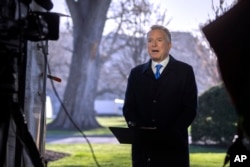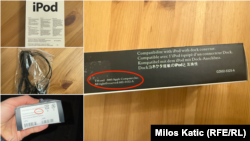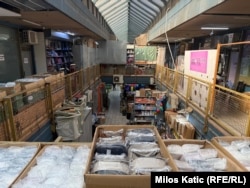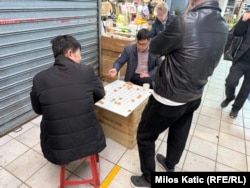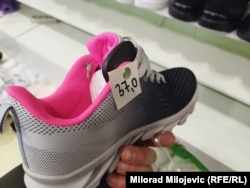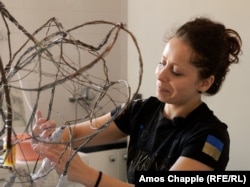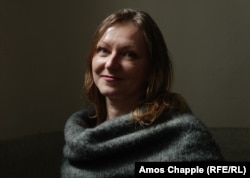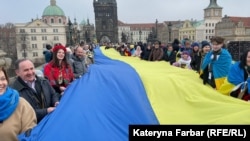Europe
- By RFE/RL
Hundreds Mourn At Farewell For Four US Soldiers Who Died In Lithuania
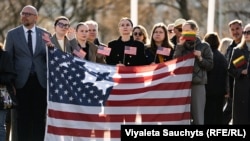
Hundreds of Lithuanians gathered in Vilnius on April 3 to honor four American soldiers who died during a training exercise in Lithuania, as a procession carrying their coffins passed through the city's Cathedral Square.
Lithuanian President Gitanas Nausada, who attended the ceremony, expressed his condolences to the families of the soldiers and said the recovery operations, supported by international cooperation, were "the best proof of NATO's invincibility."
“Their readiness to be with us, as they say, in a difficult neighborhood, is the best proof of who our friends are today," Nauseda told reporters.
Defense Minister Davile Sakaliene and the archbishop of Vilnius were among those present at the ceremony.
Sakaliene emphasized that the joint rescue efforts by soldiers from Lithuania, the United States, Germany, Poland, and Estonia demonstrated "unity" in times of crisis.
"We consider US soldiers in Lithuania as our own. The farewell ceremony once again demonstrated our society's solidarity, respect, and gratitude to the Americans," the Lithuanian Defense Ministry said in a post on Facebook.
The last US soldier missing in Lithuania was found dead on April 1, ending a massive weeklong search for the four service members whose armored vehicle was pulled from a swampy training area, the US military said.
The bodies of the first three soldiers from the US Army's 1st Armored Brigade Combat Team, 3rd Infantry Division, and their M88A2 Hercules armored recovery vehicle had been retrieved on March 31.
The soldiers were on a tactical training exercise when they went missing.
US Major General Curtis Taylor, commanding general of the 1st Armored Division, earlier expressed thanks to everyone who contributed to the recovery operation.
"We cannot thank our allies and fellow service members enough, especially Lithuanians, who spared no resource in support of this mission," he said.
Lithuania, a NATO and EU member, hosts more than 1,000 US troops stationed in the Baltic nation on a rotational basis.
During Visit By Israel's Netanyahu, Hungary Announces It Will Withdraw From ICC
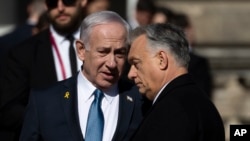
Hungary announced it is withdrawing from the International Criminal Court (ICC) as Israeli Prime Minister Benjamin Netanyahu arrived in Budapest for his first trip to Europe since an ICC arrest warrant was issued for him over alleged war crimes in Gaza.
Hungarian Defense Minister Kristof Szalay-Bobrovniczky met Netanyahu at the Budapest airport at around 2:30 a.m. before acknowledging the Israeli leader's arrival in a post on Facebook.
Hours later, Prime Minister Viktor Orban's chief of staff, Gergely Gulyas, was quoted by the state news agency MTI as saying the government was moving to pull out of The Hague-based court, confirming what diplomatic sources inside Hungary told RFE/RL earlier this week.
Orban followed that by saying during a news conference with Netanyahu that "recent ICC decisions show that it has become a political instrument" as witnessed "most clearly by the decisions on Israel."
"We are exiting the ICC," he added.
Even before the announcement, Netanyahu was virtually certain he would not be detained during his four-day visit.
As a signatory to The Hague court, Hungary has an obligation to arrest him, but its domestic legal situation is complicated and has given the government enough wiggle room to welcome him.
Since the court has no police force of its own, it has no way to enforce its rulings and relies on states to comply.
The process of leaving the ICC is expected to take up to a year as parliament must approve such a move.
"The Hungarian justice minister will hand over to the national parliament the paperwork on our termination of cooperation with the court," Orban said.
Orban publicly extended an invitation to Netanyahu in November shortly after the ICC issued the warrant, and has called the ICC warrant “Brazen, cynical and completely unacceptable.”
"I will guarantee him, if he comes, that the judgment of the ICC will have no effect in Hungary," Orban said.
What Are The Political Reasons?
Orban has closely aligned himself with Netanyahu and with US President Donald Trump, who has also criticized the court's warrant. Neither the US nor Israel are parties to the ICC.
Trump issued sanctions against the ICC last month, criticizing as "baseless" its arrest warrants for Netanyahu and former Israeli Defense Minister Yoav Gallant.
The indictment says Netanyahu is "allegedly responsible for the war crimes of starvation as a method of warfare and of intentionally directing an attack against the civilian population; and the crimes against humanity of murder, persecution, and other inhumane acts from at least 8 October 2023 until at least 20 May 2024."
What's The Legal Position?
Other countries have defied the court's arrest warrants in the past, and even German Chancellor Olaf Scholz said on April 3 he could "not imagine" an arrest warrant being executed against Netanyahu if he were to visit Germany.
"It is not for states to unilaterally determine the soundness of the court's legal decisions," court spokesman Fadi El-Abdallah told RFE/RL, adding it was a "legal obligation to the court" to enforce them.
This view was endorsed by two senior lawyers who spoke to RFE/RL.
"If Mr. Netanyahu visits a state party like Hungary or Germany and is not arrested, this state violates its obligations under the Rome Statute of the ICC," said Kai Ambos, professor of criminal and international law at Germany's Goettingen University.
"The nonexecution of ICC arrest warrants undermines the court's legitimacy," said Ambos, who serves as a war crimes judge at the Kosovo Specialist Chambers, an international court set up for crimes committed during the 1990s Kosovo conflict.
Tamas Adany, an associate professor of international law in Hungary, agreed with this but also pointed to a nuance.
"Globally speaking, there are countries where, whenever they ratify an international treaty, it becomes part of the law of the land," he said.
"Most other countries, where the typical language of multilateral treaties is not an official language…rely on a process called promulgation" to make an international obligation part of national law, he said.
Hungary ratified the Rome Statute in 2001 under the first Orban government. But it has never carried out the second step, which basically amounts to incorporating the statute into the country's own national legal code.
"The question is hard because Hungary is under a legal obligation from the perspective of international law to comply with this. But Hungarian national law does not make it possible for the authorities [to do so]," Adany said.
This reasoning has also been used by the Hungarian authorities.
"Thanks to former President Janos Ader, we had the sense to never make it part of domestic law," government spokesman Gergely Gulyassaid on March 13.
Yet Adany said the law was not entirely clear on this point, because Netanyahu is accused of crimes that have been considered part of customary international law since the 1940s.
"I'm very positive that those parts of the Rome Statute, which are considered by a majority of states to be customary international law in nature, should be enforced in Hungary even without a formal promulgation," he said.
Is Hungary Alone?
Gulyas pointed to another reason for not arresting Netanyahu. When the court warrant was issued, Germany offered an ambiguous response.
"I find it hard to imagine that we would make arrests on this basis," government spokesman Steffen Hebestreit said, adding that legal questions had to be clarified about the warrant.
Then, in January, Christian Democrat leader Friedrich Merz said he would find "ways and means" to invite Netanyahu to Germany. Merz's party subsequently won federal elections, and he is now preparing to take office as the country's next chancellor.
Gulyas, the Hungarian government spokesman, seized on this.
"Since a country of Germany's size and power thinks that it must disregard its own domestic law because the decision of the International Criminal Court is so absurd, what is the point of the whole thing?" he said.
What Would Be The Consequences?
Merz's comments were hugely controversial in Germany.
Ambos said there could be "sanctions" for not carrying out an arrest warrant, imposed by the ICC's Assembly of State Parties, which is responsible for various court matters, including the election of judges and prosecutors and setting its budget.
"Such a situation just arose with regard to Vladimir Putin's visit and nonarrest in Mongolia," he added, referring to the Russian president's visit there in September.
Putin is wanted for the war crime of abducting children from Russian-occupied Ukraine.
"The consequence for Hungary is that we may possibly lose our voting rights in the Assembly of States Parties," Adany said, adding there could be a "judicial investigation into this conduct of Hungary."
The political fallout might be quite limited.
Hungary is already highly isolated within the European Union, where it has been accused of democratic backsliding and curtailing media freedom. Its pro-Russia positions have also led to diplomatic problems.
"I'm absolutely positive that the arrest is not going to happen," Adany said. "Netanyahu is going to travel home safely."
- By RFE/RL
Rubio Reiterates US Commitment To NATO At Foreign Ministers Meeting In Brussels
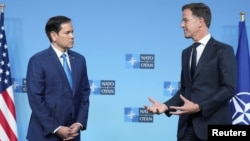
US Secretary of State Marco Rubio said the Trump administration is committed to remaining in NATO and urged the military alliance's 32 members to pledge to increase spending to strengthen its defense capabilities.
Speaking as he arrived in Brussels for a two-day meeting of NATO foreign ministers, Rubio said the United States was "as active as it has ever been" in the alliance as he sought to allay concerns that US President Donald Trump is undercutting transatlantic relations.
"President Trump's made clear he supports NATO. We're going to remain in NATO," Rubio said before entering the meeting.
"We do want to leave here with an understanding that we are on a pathway, a realistic pathway, to every single one of the members committed and fulfilling a promise to reach up to 5 percent of spending. That includes the US."
Ahead of the meeting, NATO Secretary-General Mark Rutte also tried to tamp down fears over Trump's commitment to the alliance, saying in his mind the US's dedication to NATO "is absolutely clear."
"I know there has been some tough language. I know that there have been allies, for example, on this side of the pond being worried about the long-term commitment of the US to NATO," Rutte said on April 2.
"I'm absolutely convinced this alliance is there to stay with the US. Their commitment is absolutely clear," he added.
NATO allies have been determined to present a united front to counter Russia's full-scale invasion of Ukraine, but the European allies feel their efforts have been marginalized.
In search of a quick cease-fire deal, Washington has suggested Ukraine might have to make territorial concessions and taken step to restart a dialogue with Russia.
Rubio is expected to be confronted with questions from allies who are alarmed, angered, and confused by the Trump administration's moves to mend ties with Russia and its rhetorical attacks on longtime transatlantic partners.
Based on what they have seen and heard since Trump took office in January, European officials have expressed deep concerns about the future US role in the alliance.
Rubio likely also will be pressed to explain Trump's stated desire to make NATO ally Canada the 51st state and his push to annex Greenland, which is autonomous within the Kingdom of Denmark, another NATO ally.
NATO leaders in June were expected to decide whether to raise the defense spending target for each individual member from its current minimum of 2 percent of gross domestic product (GDP).
The Trump administration has previously floated the idea of a 5 percent of GDP spending minimum, while Rutte has been pushing for every ally to commit to spending at least 3.7 percent of GDP on defense as quickly as possible.
Some European allies will be reluctant to commit too much on defense too soon given they are struggling with low growth and ballooning budget deficits.
Trump's announcement of stiff tariffs on almost every country around the world -- which EU trade chief Maros Sefcovic on April 3 called "unjustified" -- have exacerbated fears that economic growth could slow even further.
Ukrainian Foreign Minister Andriy Sybiha will also attend the NATO meeting and is expected to provide an update on the situation on the battlefield in the war against Russia.
While Ukraine's membership in NATO is off the table for now, most European allies are keen to at least get assurances that US weapons will continue to go to Ukraine and that NATO's training mission for Ukrainian soldiers continues to operate.
However, the United States is no longer chairing the Ukraine Defense Contact Group, known as the Ramstein group, which coordinates military support for Kyiv. The United Kingdom chaired the last meeting of the group in February, and the next one tentatively scheduled for April 11 could be co-chaired by the UK and France.
EU Aims To Elevate Ties With Central Asia At Landmark Samarkand Summit
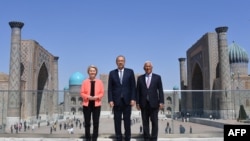
The European Union and Central Asian countries have kicked off their first-ever high-level summit as the bloc eyes new trade and infrastructure investments while aiming to significantly elevate Brussels' ties with the region, according to a draft document for the meeting seen by RFE/RL.
"Reaffirming our commitment to deeper cooperation in an evolving global and regional geopolitical landscape, we have decided to upgrade relations between the European Union and Central Asia to a strategic partnership," states a draft EU version of the joint declaration for the April 3-4 summit's intended outcomes.
Beyond strengthening political ties between Brussels and Central Asia, the draft document, which could still be subject to change, outlines deepening the EU's partnership with the region through enhanced cooperation on water management, critical minerals, and a focus on digital connectivity.
As outlined in the draft document, the 27-country bloc also calls for a greater focus on trade and investment and lumping the array of proposed initiatives for Central Asia under the Global Gateway, the EU's infrastructure partnership plan launched in 2021 that's seen as an alternative to China's worldwide Belt and Road Initiative (BRI).
A key part of the Global Gateway's early footprint in Central Asia is the Trans Caspian Transport Corridor (TCTC), also known as the Middle Corridor, a 6,500-kilometer developing trade route that connects China to Europe through Central Asia and the Caucasus by bypassing Russia. The EU document calls for the route to be expanded further.
The summit is something of a watershed moment for the EU as it aims to boost its regional standing at a time when Russia's full-scale invasion of Ukraine has shifted the geopolitical balance in Central Asia and China's economic expansion has left the region more integrated with Beijing.
But analysts say there are still questions in the region about the EU's interest in Central Asia.
"Central Asia wants a bigger EU presence, but the region's leaders don't have high expectations," Temur Umarov, a fellow at the Carnegie Russia Eurasia Center in Berlin, told RFE/RL.
"So far, the EU hasn't put enough money on the table to make them think that Europe can be this third player that allows Central Asia to rely less on Russia and China," he said.
Why Is The EU Looking To Partner With Central Asia?
Since 2023, Western leaders have been flocking to Central Asia on high-level state visits as they've looked to take advantage of the economic and political window opened by Russia's full-scale invasion of Ukraine in February 2022.
While Central Asian governments have maintained strong ties with Moscow, they've also accelerated their efforts to diversify their relations with other countries. This push to woo new partners and deepen preexisting ties has been boosted by the region containing some of the world's largest hydrocarbon reserves and critical raw materials.
The result has been a flurry of diplomatic inroads made by Brussels and individual European states such as France and Germany in recent years. Turkey, the United Arab Emirates, and other Middle Eastern countries have also expanded their presence.
But the region's deepest inroads have been carved out by China. Beijing has established itself as a leading trade partner and top foreign investor in Central Asia, and China hosted its own landmark summit with Chinese leader Xi Jinping and his regional counterparts in 2024.
Bilateral trade between Central Asia and China, its largest individual trade partner, has been rising steadily in recent years, hitting a record high of $94.8 billion in 2024, but with its 27 member states, the EU is Central Asia's biggest foreign investor.
The EU and the five Central Asia states signed a road map for expanding their ties in 2023. This was later followed by an investors forum in 2024 that saw the EU pledge 10 billion euros ($10.8 billion) toward the Middle Corridor trade route.
Can The Global Gateway Compete With China?
The EU's heightened interest in Central Asia is driven in part by its need to secure new energy supplies and gain access to critical minerals but also to help diversify the region away from its historical reliance on Moscow.
Central to these needs are the development of the Middle Corridor and deepening of the Global Gateway's profile.
"One of the core elements of the EU's approach to Central Asia is to develop connectivity to and through this region," Marie Dumoulin, a program director at the European Council on Foreign Relations, told RFE/RL. "Central Asian countries should benefit from the Global Gateway initiative, but concrete projects are slow to materialize and not very visible."
Since the all-out war in Ukraine, the Middle Corridor has attracted new investment and seen the amount of cargo traveling along its roads, railways, and shipping lanes expand after being avoided for years due to rising costs and border issues.
But the trade route is still grappling with limited capacity and bottlenecks at key ports due to a lack of infrastructure, which still holds it back from being an alternative to the traditional Northern Route that takes goods from China through Russia to Europe.
The EU-Central Asia summit in Samarkand is looking to inject new momentum into those initiatives.
Jacob Mardell, a senior fellow at Sinification and the author of a new report about the future of the Global Gateway, says the EU's infrastructure program gives Brussels an opportunity to create more goodwill in Central Asia and become a more visible player on the ground in a way similar to how the BRI allowed China to expand as an investor and create new opportunities for Chinese businesses.
"Global Gateway might not be a direct response to BRI, but it's a response to the changing environment that the BRI created when it challenged the status quo for development finance," Mardell told RFE/RL. "The EU now has a chance to respond."
- By RFE/RL
Trump Signs Order Imposing 10 Percent Baseline Reciprocal Tariffs, 20 Percent On Imports From EU
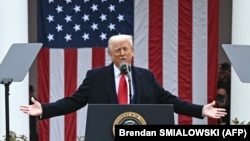
US President Donald Trump on April 2 announced reciprocal tariffs on US trading partners, including 20 percent on goods from the European Union, in a move some experts fear will set off a trade war and cause the world's economy to tank.
Trump called it America's "liberation day," saying it will "forever be remembered as the day American industry was reborn, the day America's destiny was reclaimed, and the day that we began to make America wealthy again."
Speaking in the White House Rose Garden, Trump said he would impose a 10 percent baseline tariff on all imports to the United States and higher duties on imports from dozens of countries around the world.
After railing about how the United States for decades had been "looted, pillaged, raped, and plundered by nations near and far and by friend and foe alike," Trump held up a chart that listed reciprocal tariffs. They included 20 percent on goods from the European Union, 34 percent on Chinese goods, 46 percent on Japanese products, 32 percent on Taiwanese imports, and 25 percent on South Korean imports.
More than a dozen other countries, including Britain, India, Brazil, and Switzerland, also were listed. In each case, he said the US tariffs could have been much steeper, but he opted for "kind reciprocal" tariffs that are half those charged by US trading partners.
Trump said the tariffs imposed by other countries and "colossal trade barriers" had in many cases closed markets around the world to US-manufactured and US-grown agricultural products and had contributed to big trade deficits and a ballooning national debt.
Trump said countries that want access to the US market will now have to "pay for the privilege," adding that he campaigned on the policy throughout last year's presidential race "and today that promise…was kept."
Outside economists have warned that tariffs could slow the global economy, raise the risk of recession, and increase annual living costs for the average US family by thousands of dollars.
British Finance Minister Rachel Reeves was among the first to respond to Trump's announcement, saying, "Trade wars are no good for anyone," while the European Auto Suppliers Association said the 25 percent tariff on vehicles "is misguided and harmful," including for people in the United States.
"Placing tariffs on imports of autos risks damaging the competitiveness and export readiness of an industry that relies on integrated international supply chains and markets for its success," the association said in a statement.
The move marks the rejection of "the rules-based global trade order" and a "turning away from the basis for global value creation and corresponding growth and prosperity in many regions of the world," said Hildegard Mueller, president of the German auto industry association VDA.
But Trump said the tariffs will benefit American farmers, skilled laborers, autoworkers, and the improve the overall economy. He said many major corporations have already pledged to bring manufacturing back to US shores.
"Jobs and factories will come roaring back into our country, and you see it happening already. We will supercharge our domestic industrial base," he said. "We will pry open foreign markets and break down foreign trade barriers and ultimately more production at home will mean stronger competition and lower prices for consumers."
Asian stock markets were lower in early trading on April 3 after Stephen Miran, chairman of the White House Council of Economic Advisers, acknowledged there will be "short-term bumps" caused by the tariffs.
"But what the president is focused on is a long-term transformation and improvement in the durability, sustainability, and fairness of the American economy with respect to the rest of the world," Miran told Fox Business.
Trump has already imposed 20 percent duties on all imports from China and 25 percent duties on steel and aluminum and extended them to nearly $150 billion worth of other key products used in manufacturing.
Trump said the tariffs he announced on April 2 would take effect starting on April 3. The White House said a separate set of tariffs on auto imports that Trump announced last week also will take effect starting on April 3.
Tariff concerns have already slowed manufacturing activity across the globe. Financial markets have been volatile in recent days as investors awaited the announcement. US stocks have erased nearly $5 trillion of value since February.
With reporting by Reuters and AP
- By Ray Furlong and
- Olena Abramovych
A Month On, Ukraine Is Still Waiting For The Coalition Of The Willing
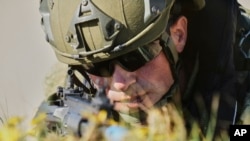
Exactly a month since British Prime Minister Keir Starmer announced the formation of a “coalition of the willing” to form a military mission to Ukraine, many questions remain.
Starmer said the plan would involve British “boots on the ground and planes in the air, together with others.”
This immediately raised uncertainty about who will contribute and how. Answers are still scarce.
Who Could Send Troops To Ukraine?
So far, France is the only other nation that has made a clear commitment to send military forces to Ukraine as part of the mission.
The London conference and subsequent meetings have involved some 30 countries. Some of these will probably be involved in a backup function.
Germany, for instance, has made noises about sending troops under a UN-mandate, but Russia opposes the mission and would veto it. So, Berlin’s involvement would likely be based on out-of-country support, such as logistics.
Ukrainian President Volodymyr Zelenskyy met in Kyiv on April 1 with outgoing German Foreign Minister Annalena Baerbock, saying that a "narrow circle of countries" is willing to send contingents.
Some countries have indicated that they could be in that circle.
Asked about sending troops, Swedish Prime Minister Ulf Kristersson said it was “ready to help… under certain conditions”, while Danish Foreign Minister Lars Lokke Rasmussen said his country was prepared for it “in principle.”
Australian Prime Minister Anthony Albanese has said his country may send “a small contribution,” but he faces elections in May. Belgium said it would be "logical" to participate.
Some of the 30 countries have ruled out sending troops, such as Poland, which is prioritizing its own immediate security concerns vis-a-vis Russia and Belarus. Greece has also said it won’t deploy.
Turkey, a major military power neighboring Ukraine with substantial air and naval assets, would be a big potential contributor. It has not made a clear statement one way or the other.
What Would Western Troops Do In Ukraine?
The initiative has often been referred to as a peacekeeping mission, but this is a misnomer.
"If we call it a 'peacekeeping mission,' we usually mean a peacekeeping mission within the framework of the UN, which requires participation in the agreements of both sides. An 'assurance mission' does not require Russia's consent," a NATO diplomat told RFE/RL’s Ukrainian Service on April 1.
The idea is that, after a cease-fire or peace deal is reached, the force deploys to help give Ukraine confidence that Russia won’t attack it again.
“If there was again a generalized aggression against Ukrainian soil, these armies would be under attack and then it’s our usual framework of engagement,” French President Emmanuel Macron said ahead of a summit held by the coalition in Paris on March 27.
“Our soldiers, when they are engaged and deployed, are there to react and respond to the decisions of the commander in chief and, if they are in a conflict situation, to respond to it.”
But a frontline deployment is not envisaged.
Speaking after the Paris gathering, Macron said the forces would be at “certain strategic locations.” Starmer and Zelenskyy have spoken of forces covering air, sea, and land.
Over the last few weeks, military planners have been preparing for various scenarios.
NATO diplomats told RFE/RL that the final vision of the future contingent has not yet been determined and will largely depend on the circumstances leading to its eventual deployment.
Russian Opposition
Russia has long made it clear it opposes any deployment to Ukraine involving forces from NATO countries. As noted, this rules out a UN-mandated mission.
But European countries have indicated they would be willing to deploy without Russian assent. Macron made this clear in a recent interview with French regional newspapers.
“If Ukraine requests allied forces to be on its territory, it is not up to Russia to accept or reject them,” he said.
But if Russia can’t stop the mission, there may be one more hurdle.
The US Backstop
From the very beginning, the deployment of the forces has been predicated on the existence of what Starmer called a US “backstop.”
This refers to the provision of air support, logistics, and intelligence. But so far there has been no clear signal from Washington that it’s ready to help.
On the contrary, there’s been withering criticism from one of US President Donald Trump’s closest aides. Steve Witkoff, a key figure in efforts to broker a cease-fire between Russia and Ukraine, dismissed it as “a posture and a pose.”
One diplomat from a European NATO member told RFE/RL this was a challenge that needed to be overcome.
"We have to come up with a specific proposal and present it to the United States," he said. "We should not demonstrate complete dependence on the American presence. We should have self-respect. We have to act ourselves and then invite the United States to join."
The former head of the US Army in Europe, Ben Hodges, told RFE/RL last month that Europe should go it alone.
“The soldiers that I have encountered over the years from the UK, France, Germany, the Netherlands, Finland, and Poland are quality women and men with good equipment,” he said.
What Next?
Since Starmer’s initial remarks, there has been a series of meetings at various levels to work on the proposals. The next talks, announced by Zelenskyy, are set for April 4.
The process may have some way to go.
"This is an attempt to find a new form of guarantees from our European partners,” Serhiy Leshchenko, an adviser in President Zelenskyy’s office, told RFE/RL last week.
"It takes time. There is no need to expect instant solutions here."
'No Positive Signs From Russia,' Says Kallas As Cease-Fire Talks Drag On
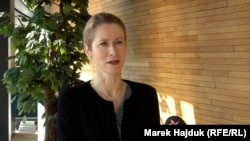
STRASBOURG, France -- European Union foreign policy chief Kaja Kallas says there have been “no positive signs from Russia” in ongoing cease-fire negotiations over Ukraine, and that Moscow is “just playing games.”
She made the remarks in an exclusive interview with RFE/RL on the sidelines of a European Parliament plenary session in Strasbourg on April 2.
Russia, Ukraine, and the United States have been locked in negotiations for a month in an effort to end the three-year full-scale war.
While partial cease-fire agreements have been reached -- covering energy infrastructure and traffic on the Black Sea -- Russian missile and drone attacks on Ukrainian cities continue on a daily basis.
Watch the full Interview With Kaja Kallas:
Asked whether she believes a full cease-fire can be achieved by April 20 -- a target date floated by Finnish President Alexander Stubb during a recent visit to US President Donald Trump in Florida -- the former Estonian prime minister stressed that pressure must be placed on Moscow.
“I think it could be very good to set them a clear deadline when they have to answer, what is their standing, and to really show some goodwill that they also want peace,” she said. “It's clear that the Ukrainians want it.”
Not Talking With Russia Yet
This week, Kirill Dmitriev, a senior Kremlin adviser and head of a major state-backed investment fund, is expected to visit Washington for talks with US officials on Ukraine and bilateral relations, the Kremlin said.
Dmitriev's reported visit comes as Washington and Moscow move to repair relations following years of spiraling tensions that predate Russia's February 2022 all-out invasion of Ukraine.
When asked whether the EU should also engage directly with Dmitriev, Kallas said any discussions must center around Kyiv.
“For Ukraine, Ukraine has to negotiate with Russia,” she said. “It can't be done by anybody else, because it's about Ukraine and it can't be without Ukraine.”
So far, the European Union and its 27 member states have been sidelined from the talks. Pressed on whether the bloc or any of its member states were ready to talk directly with the Kremlin, Kallas emphasized that Europe must be part of any long-term settlement.
“When it comes to negotiations about Ukraine, then clearly Europe must be around that table because it also concerns us what is the result of this,” she said. “And any deal can't work without the implementation of the Europeans.”
Transatlantic Trade War?
Kallas, who took over as the EU high representative in late 2024, will later this week attend the NATO ministerial in Brussels together with the new US Secretary of State Marco Rubio.
The meeting comes at a time of rising transatlantic trade tensions.
On April 2, Washington imposed a 25 percent tariff on all car imports, following steel and aluminum levies introduced in March.
Brussels is preparing a response, expected later in April, which is likely to include penalties targeting big US tech companies.
Kallas, however, was keen to play down the latest rift, saying that, despite a lot of rhetoric on the subject, European negotiators still “don't really know what is exactly coming.”
“There are the statements we see, but what are the real actions?” she said. “What I want to stress is that there are no winners in trade wars. I mean it raises the prices and in the end the consumers get to pay for these products at a higher price and this is not wise, so I still hope that we are not starting this trade war.”
New Format For Serbia-Kosovo Dialogue?
On April 7–8, Kallas will visit Albania, Bosnia-Herzegovina, and Montenegro -- her first trip to the Western Balkans since taking office. A visit to Serbia is also likely in May.
Asked about the recent wave of anti-government protests in Serbian cities -- sparked by the deadly collapse of a newly renovated train station roof in Novi Sad which has fueled public anger over corruption and government mismanagement – Kallas suggested such demonstrations were normal in democratic societies.
“It is democracy,” she said. “I mean we have it in our EU member states that people get tired of governments, and they protest. That shows that democracy is working.”
The EU has led the dialogue between Serbia and Kosovo since 2011, aiming to normalize relations between them.
Kallas’s predecessor, Josep Borrell, last met with the leaders of the two Balkan countries in September 2023 but failed to strike a final agreement.
While Kallas has named Danish diplomat Peter Sorensen as her special envoy for the talks, no high-level meetings have yet been convened, and she hinted that a new approach may be needed.
“It seems a bit that the dialogue is a bit stuck, because the parties just are complaining about each other,” she said. “I think we have to keep the end goal in mind -- the normalization of their relationship, so that they can both proceed on their European path. So maybe it's the dialogue, or maybe it is another tool. I'm willing to look into it, and I will do so together with the [Sorensen] in the coming days.”
Mourners Honor US Soldiers Who Died In Lithuania Training Exercise
Mourners gathered at the US Embassy in Lithuania on April 1 to honor four American soldiers who died after their M88 Hercules armored recovery vehicle became submerged in a peat bog during a training exercise. The military announced on March 31 that they found three victims inside the vehicle after an intensive six-day search by US, Lithuanian, Polish, and Estonian rescue teams. A fourth soldier was found the next day.
EU Lawmakers Debate Support For RFE/RL Amid US Funding Freeze

European Commissioner for Enlargement Marta Kos has emphasized the “need to protect Radio Free Europe/Radio Liberty (RFE/RL),” warning that "if we don’t, we hand a gift to autocrats the world over."
Her remarks came during a debate in the European Parliament plenary in Strasbourg on April 1 that focused on safeguarding access to democratic media, including RFE/RL.
The debate was initiated in response to an executive order signed by US President Donald Trump on March 14, which reduced the size of the US Agency for Global Media (USAGM), the body overseeing RFE/RL.
Shortly afterward, Kari Lake, a senior adviser to the USAGM CEO, issued a letter stating that the Congress-approved grant funding the broadcaster had been terminated.
While the grant termination has since been rescinded, the USAGM has not sent any of the congressionally appropriated funds, prompting RFE/RL to furlough some of its staff on April 1.
Kos, speaking on behalf of the EU foreign policy chief Kaja Kallas, said that “the European Union needs to be a refuge for independent media, including from Russia and Belarus, so they can continue their work; holding their political and business elites to account and exposing corruption.”
While the commissioner refrained from speaking about the potential of the EU stepping in to fund the media organization, several members of the European Parliament did mention the idea.
Stormy Discussion
Sebastiao Bugalho, a Portuguese member of the largest group in the chamber, the center-right European People’s Party, said that “we will pay the price and shoulder the burden.”
Lithuanian lawmaker Virginijus Sinkevicius from the Greens underlined that “we must ensure that RFE/RL has access to long-term and stable funding, including from the EU.”
Alexandr Vondra, who was a prominent dissident in communist Czechoslovakia and is now a Czech MEP from the right-wing European Conservatives and Reformists, said that the radio helped spread information in repressive countries such as Iran, Belarus, and Russia, and called on the European Union to contribute to the station’s finding.
“Let us be open to finance [RFE/RL] also from EU money and find agreement on what form,” he said.
The one-hour debate became rather stormy at times with lawmakers shouting at each other in between speeches.
Several members from populist groups in the Strasbourg chamber spoke against potentially using EU money to finance the broadcaster.
Mary Khan, an MEP from the far-right Alternative for Germany party, said that RFE/RL “can finance itself” and added that “media should not be financed by European institutions.”
Slovak MEP Milan Uhrik, who belongs to the same Europe of Sovereign Nations Group as Khan, said that the EU should instead help farmers in Slovakia battling foot-and-mouth disease among its cattle, adding that “your independent media is the absolute opposite of independent media.”
Julien Sanchez, a French parliamentarian belonging to the Patriots for Europe, another populist right-wing fraction, said that the chamber was “hypocritical” in talking about this situation and “interfering with the situation in the United States.”
The debate will have no resolution to be voted on during this plenary session, which ends on April 3, but this could come at a later stage as several European parliamentary officials told RFE/RL that the house will continue to monitor the situation.
EU Faces Crossroads On Russia Sanctions As Rubio's NATO Debut Looms
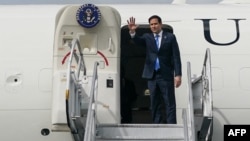
Welcome to Wider Europe, RFE/RL's newsletter focusing on the key issues concerning the European Union, NATO, and other institutions and their relationships with the Western Balkans and Europe's Eastern neighborhoods.
I'm RFE/RL Europe Editor Rikard Jozwiak, and this week I am drilling down on two issues: When Russia could get sanctions relief and Marco Rubio's first NATO ministerial.
Briefing #1: EU Won't Lift Sanctions On Russia -- Yet
What You Need To Know: In recent weeks, the United States, Russia, and Ukraine have been sketching out cease-fire frameworks: one aimed at protecting energy infrastructure like power plants and transmission lines and another focused on reducing military activity in the Black Sea.
One of Moscow's big asks has been publicly communicated: sanctions relief. In a Kremlin statement issued after the Black Sea cease-fire agreement on March 25, Moscow declared it would only observe the deal if the West partially lifted sanctions imposed following its full-scale invasion of Ukraine more than three years ago.
This demand includes lifting restrictions on fertilizer exports and the insurance companies that cover them, as well as reconnecting several Russian banks to the SWIFT global payment system.
Several EU leaders have already dismissed Moscow's request, most notably during a March 27 meeting in Paris , where top officials from more than 30 countries gathered to discuss security guarantees for Ukraine.
When I spoke with numerous European diplomats, they all pointed out that the White House statement released the same day made no mention of sanctions relief.
As one EU ambassador put it to me, referring to the recent cease-fire talks in Riyadh: "No deal was made on this in Saudi Arabia, so therefore nothing to decide for us."
Deep Background: The Europeans have obviously not been present at the cease-fire talks, but they do have a rather large say on Russia sanctions.
SWIFT is a Belgian company, for starters, and the EU has "de-SWIFTed" 23 Russian banks so far, including big ones such as Sberbank and Bank Otkritie.
They are also aware that Russia's trade relations with Europe run deeper than they do with the United States.
Even before the full-scale invasion, US exports to Russia amounted to less than 0.5 percent of total American worldwide exports. For the EU, that figure was 6 percent, which is equivalent to 250 billion euros ($272 billion).
So, when wide-ranging EU sanctions were imposed, it hit Moscow harder. The EU's sanctions czar, David O'Sullivan, estimates that restrictive measures have deprived Russia of more than 450 billion euros ($490 billion) in revenue since early 2022.
So, are the Europeans considering even a partial easing of sanctions on Russia?
The answer I consistently hear is a simple "no" or "we will decline this."
Officials point to Russia's ongoing drone and missile attacks on Ukraine, as well as the conclusions of a recent EU gathering, which signaled a potential ramping up of measures rather than a relaxation of pressure. As the Main Results of the March 20 European Council meeting on Ukraine put it: "The European Union remains ready to step up pressure on Russia, including through further sanctions and by strengthening the enforcement of existing measures."
The European Commission has not yet invited EU member states for so-called sanctions confessionals to discuss a new sanctions package, which would be the 17th in three years, but they are looking into things like closing sanctions circumvention loopholes.
Drilling Down
- The conclusions of the European Council meeting on March 20 were approved by 26 out of 27 EU member states. The one not aligning? Hungary, which for a long time has been critical of EU sanctions .
- This is significant for one reason: lifting EU sectoral sanctions requires unanimity, and that simply doesn't exist right now. As noted above, many member states are calling for more sanctions, not fewer. But here's the catch: Every six months, in January and July, the entire sanctions package must be extended -- and that also requires unanimous approval.
- It is here where Hungary, and potentially others, might want to come in and start scaling down. In January, Budapest was threatening the entire rollover and only gave the green light after getting written assurances that Russian oil would continue to flow into Hungary.
- EU diplomats I've spoken to are already fearing what the July sanctions extension might look like and what concessions they may have to make to secure a rollover as a whole.
- The regular EU summit at the end of June will likely involve intense horse-trading on this, with Hungary eyeing more frozen EU funds for itself and several member states eager to launch EU accession talks with Kyiv by the summer -- a move Budapest has blocked so far.
- De-SWIFTing some banks and allowing Russian fertilizers into the bloc again are obviously low-hanging fruit in this regard. But this will, of course, depend on what the situation looks like on the ground in Ukraine at that time.
- One thing is clear, however: Despite immediate rejections from European diplomats, Moscow has planted a seed. As one European diplomat put it to me: "I believe it is a smart salami method the Russians have started here. Already into the cease-fire talks, they bring far-reaching demands that, in fact, belong more in a comprehensive peace deal discussion. It should be us this time who are 'transactional' and give this powerful tool away only for a fair price."
- So what could this fair price be? In a sense, European officials will look to Kyiv to provide the answer. But according to those I've spoken with, the contours could include limited sanctions relief in exchange for freezing the front lines, no recognition of occupied territories as Russian, and continued Western military deliveries to Ukraine, with the snapback option of sanctions if breaches occur. The question is whether Brussels and Kyiv can get Moscow to agree to such a deal and what the United States will think of it.
Briefing #2: Rubio Comes To Brussels
What You Need To Know: On April 3-4, NATO foreign ministers will gather in Brussels for their regular spring meeting.
Much like the defense ministerial in February, all eyes will be on the American representative. Then, it was Defense Secretary Pete Hegseth; this time, it's Secretary of State Marco Rubio.
When Rubio was first slated for the role in the new Trump administration, most Europeans rejoiced. He was seen as an ardent "transatlanticist."
Now, there is a certain nervousness, according to NATO diplomats I have spoken to.
While some say, "He still gets us and the alliance," they wonder what influence he really has within the US government and what he will say when it comes to Ukraine, Russia, and China.
Two things, however, are apparent.
Just like Hegseth, Rubio will hammer home the message that European allies need to step up on defense spending and burden sharing.
And, just like in February, the allies will hope that the United States reconfirms its commitment to NATO and its mutual defense clause, Article 5.
Since the only other NATO gatherings before the alliance's June summit are an informal foreign ministers' meeting in Turkey in mid-May and a defense ministers' session in early June, this week's meeting serves very much as a dress rehearsal for the summit in The Hague on June 24-26.
The goal for that meeting is clear: Keep the alliance together by ramping up defense spending considerably.
NATO Secretary-General Mark Rutte is pushing for every ally to commit to spending at least 3.7 percent of gross domestic product on defense as quickly as possible and with regular progress reports.
This push is aimed at placating US President Donald Trump at the summit, but some European allies will be reluctant to commit too much on defense too soon given they are struggling with low growth and ballooning budget deficits.
Deep Background: Perhaps the one thing to look out for during the ministerial is the session devoted to NATO-EU relations, with the latter being represented by the European bloc's foreign policy chief, Kaja Kallas.
Rubio snubbed Kallas when she traveled to the United States earlier this year, and all EU diplomats I have spoken to admit that Washington doesn't see the EU as a serious interlocutor.
There is also plenty of tension, not least when it comes to the European Commission's latest defense spending proposal: a potential 150 billion euro ($163 billion) loan for EU member states to buy arms, though not from non-European countries. The United States is especially wary of any moves that would lock it out of a European defense-spending splurge.
But the biggest irritant, of course, is the fraying relationship on trade.
Just one day before the NATO meeting, the United States is set to impose a 25 percent tariff on all vehicle imports, a move that will hit countries like Germany especially hard. This follows existing US duties on European steel and aluminum, which Brussels is planning to counter with retaliatory measures on April 13.
Drilling Down
- Another guest at the ministerial is Ukrainian Foreign Minister Andriy Sybiha. An update on the situation on the battlefield is expected but, again, it will be Rubio who is in the spotlight. Will the United States increase pressure on Russia in case the cease-fire deals concerning infrastructure and Black Sea traffic aren't holding?
- While Ukraine's membership in the alliance is off the table for now, most European allies are keen to at least get assurances that US weapons will continue to go to Ukraine and that NATO's training mission for Ukrainian soldiers, NSATU, continues to operate. So far, everything is still working. There also haven't been any changes when it comes to US troop posture on NATO's eastern flank.
- What has changed, however, is that the United States is no longer chairing the Ukraine Defense Contact Group, known as the Ramstein group, which coordinates military support for Kyiv. The United Kingdom already chaired the last meeting of the group in February, and the next one tentatively scheduled for April 11 could be co-chaired by the UK and France.
- Expect London and Paris to also continue working, at least on the sidelines of the ministerial, on a potential reassurance force in Ukraine should a permanent cease-fire take hold. However, details such as troop numbers, participating countries, and the exact mandate will have to remain sketchy for now.
- What's become increasingly apparent is that work on a new NATO strategy for Russia has stalled. The strategy -- defining how the alliance should engage with Moscow going forward -- was supposed to be endorsed at the Hague summit. But Washington has indicated that it wants to avoid introducing potential "irritants" on the path to a final peace deal, and such a strategy document could be exactly that.
- Finally, the foreign ministers of NATO's four Asia-Pacific partners -- Australia, Japan, New Zealand, and South Korea -- will also be participating in a session at the explicit request of the United States. While the US administration sees Beijing as a rival, its public criticism of China has so far been relatively muted. In this session, ministers will be keen to hear Rubio's take on how to approach a range of China-related issues.
Looking Ahead
Look out for the first ever EU-Central Asia leaders' summit in Samarkand, Uzbekistan, on April 4. European Council President Antonio Costa and European Commission President Ursula von der Leyen will meet with the presidents of Kazakhstan, Kyrgyzstan, Tajikistan, Turkmenistan, and Uzbekistan to discuss issues that include energy cooperation, Russian sanctions circumvention, and expanding trade opportunities.
That's all for this week! Thank you all for your wonderful feedback on last week's issue .
Feel free to reach out to me on any of these issues on Twitter @RikardJozwiak, or on e-mail at jozwiakr@rferl.org .
Until next time,
Rikard Jozwiak
If you enjoyed this briefing and don't want to miss the next edition subscribe here .
'Made In CalifoMia': How Chinese Knock-Offs Of Western Brands Hit Balkan Shelves

NOVI SAD, Serbia -- On the shelves in one of the many Chinese-owned stores here in Serbia's second-largest city are earbuds packed in a white cardboard box that reads "iPod."
Customers might think they're getting something produced by US electronics giant Apple. But eagle-eyed buyers might notice something else is off besides the cut-rate price -- just under $2 -- for such earbuds, which typically cost around $20 in Serbia.
The box reads "Apple Earphone" -- in the singular, rather than plural. And it says the contents were "made in Califomia" -- with "m" instead of "rn" in the name of the state where Apple is headquartered.
The earbuds are among the flood of Chinese-made goods masquerading as famous Western brands that have poured into the Balkans and crowded shelves in shops owned by Chinese immigrants that have mushroomed across the region in recent years.
There is no exact data on the total volume of Chinese goods shipped into the Balkans for sale as counterfeit Western products, which include not only fake Apple electronics but also shoes, clothing, and products billed as global brands like Nike, Tommy Hilfiger, Adidas, Hugo Boss, Armani, Gucci, and Louis Vuitton.
But customs data suggests the number runs at least in the hundreds of thousands of units annually, and RFE/RL's Balkan Service has established at least one route by which these products make it to Balkan store shelves -- including a stopover in an Italian port with notorious mafia connections.
A Serbia-based Chinese businessman who was until recently active in the import-export business said that around 85 percent of these goods that arrive in Serbia are shipped from the port of Ningbo on China's eastern seaboard.
Up to 2,000 items can be transported per container, making control of each item difficult, the businessman said on condition of anonymity due to possible legal repercussions.
"Customs cannot check every container and every product," he said.
The wholesale purchase of these counterfeit items is typically conducted with cash and between parties who know one another and have longstanding business relations, he added.
The businessman said that from Ningbo, goods are shipped to the Italian port of Gioia Tauro in Italy. From there, he said, counterfeit goods are transferred in smaller ships to ports in Rijeka, Croatia; Bar, Montenegro; and Kopar, Slovenia.
RFE/RL's Balkan Service independently corroborated this route with customs authorities in Serbia, Croatia, Montenegro, and Italy.
After reaching Slovenia, Croatia, or Montenegro, the counterfeit goods are then transported to Serbia via road and rail, the Serbian Customs Administration told RFE/RL.
The agency said that last year alone its officers seized 104,000 products due to suspected intellectual property rights violations, while more than 61,000 items were destroyed -- mostly textiles.
Croatian customs officials told RFE/RL that they handle around 600 cases of suspected intellectual-property infringement cases annually, primarily at ports in Rijeka and Ploce but also at the Bajakovo border crossing with Serbia. Around 85 percent of these goods come from China, and the majority of the goods are counterfeit EU and US brands, they said.
The Montenegrin Customs Administration told RFE/RL that China remains a key country of origin for all types of counterfeit goods. Montenegrin customs officers last year seized 5,274 counterfeit items from China, up from 3,303 the previous year, it said.
The Chinese Connection
The Balkans region has become strategically important for China, which has invested in massive infrastructure projects there and signed a free-trade agreement with Serbia that has been in place since July 2024.
A majority of the Balkan countries are not members of the European Union but are part of China's Belt and Road Initiative (BRI), a global infrastructure development strategy launched by Beijing in 2013 that some Western governments warn could lead to excessive debt to China.
Chinese exports to Serbia rose an average of 16.7 percent annually from 2018 to 2023, jumping from $1.8 billion to nearly $4 billion in that period, according to the most recent data from the Observatory of Economic Complexity, a trade data platform.
Among dozens of China-based companies offering their products to the Balkan market through local Serbian companies is Shenzhen VBO Industrial Co., which produced earbuds that appear identical to those in the counterfeit Apple box in the Novi Sad shop visited by reporters. The company did not respond to a request for comment about its products being sold under the Apple brand.
Based in the Tianan Cyber Industrial Park in the city of Shenzhen in southeastern China, the plant covers 6,000 square meters and specializes in producing audio equipment.
Shenzhen VBO Industrial's website lists the price for the earbuds that reporters bought in the Novi Sad shop as $0.69-$0.99, and they are sold in a box without an Apple label. It is unclear whether the headphones that reporters found in Novi Sad were bought directly from the Chinese firm or from intermediaries in Serbia.
In neighboring Bosnia-Herzegovina, RFE/RL's Balkan Service visited Chinese-owned stores and observed other counterfeit US brands, including Nike sneakers for $20 and Tommy Hilfiger shirts for $11 -- significantly cheaper than the originals.
'Low Risk, High Profit'
RFE/RL's Balkan Service sought comment from the Italian financial police -- the Guardia di Finanza -- about Italy's role as a stopover for counterfeit Chinese goods that are shipped on to the Balkans.
Officials there responded with an October 2023 press release describing an "illegal assembly line" of counterfeit products involving Italian and Chinese organized crime -- and indicating that counterfeit labels and packaging are added to some of these goods after arrival from China.
Italian financial police did not respond to specific questions about Gioia Tauro, the port in the Italian province of Calabria that the Serbia-based Chinese businessman called a key stopover for counterfeit goods coming to the Balkans from China.
But the Gioia Tauro port is known as a hub for drug trafficking allegedly linked to the the notorious Italian crime syndicate known as the 'Ndrangheta.
Italian authorities in 2022 and 2024 said they uncovered 'Ndrangheta-linked criminal networks suspected of smuggling hundreds of millions of euros' worth of cocaine into Europe through Gioia Tauro, an operation that allegedly involved corrupt port employees.
Ruggero Scaturro, a senior analyst with the Switzerland-based NGO Global Initiative, described Gioia Tauro as the place where the legal and illegal intertwine under the firm grip of the ‘Ndrangheta.
"In essence, Gioia Tauro operates in a dual reality: a major commercial hub where anyone can theoretically trade, but one where the rules of access for illicit goods are dictated by the ‘Ndrangheta," Scaturro, whose organization monitors global organized crime worldwide, told RFE/RL.
He underlined that between Asia, the Middle East, and the EU, the Balkan region functions as a natural gateway for goods moving westward and that it remains a key distribution point.
"Counterfeit trafficking is rarely an isolated business but is often managed by the same criminal networks that control other illicit businesses," Scaturro said.
"The appeal is clear: While drug trafficking carries severe legal consequences, counterfeit smuggling remains a relatively low-risk, high-profit enterprise, making it a lucrative secondary business for these groups," he added.
Russia Wants Sanctions Lifted In Exchange For A Cease-Fire. The EU Isn't Ready To Do That.
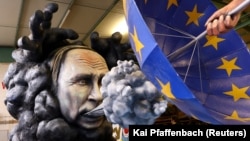
In recent weeks, the United States, Russia, and Ukraine have been sketching out cease-fire frameworks -- one aimed at protecting energy infrastructure like power plants and transmission lines and another focused on reducing military activity in the Black Sea.
One of Moscow's big asks has been publicly communicated: sanctions relief. In a Kremlin statement issued after the Black Sea cease-fire agreement on March 25, Moscow declared it would only observe the deal if the West partially lifted sanctions imposed following its full-scale invasion of Ukraine more than three years ago.
This demand includes lifting restrictions on fertilizer exports and the insurance companies that cover them, as well as reconnecting several Russian banks to the SWIFT global payment system.
Several EU leaders have already dismissed Moscow's request, most notably during a March 27 meeting in Paris, where top officials from more than 30 countries gathered to discuss security guarantees for Ukraine.
When I spoke with numerous European diplomats, they all pointed out that the White House statement released the same day made no mention of sanctions relief.
As one EU ambassador put it to me, referring to the recent cease-fire talks in Riyadh: "No deal was made on this in Saudi Arabia, so therefore nothing to decide for us."
EU Trade Relations With Russia
The Europeans have obviously not been present at the cease-fire talks, but they do have a rather large say on Russia sanctions.
SWIFT is a Belgian company, for starters, and the EU has "de-SWIFTed" 23 Russian banks so far, including big ones such as Sberbank and Bank Otkritie.
They are also aware that Russia's trade relations with Europe run deeper than they do with the United States.
Even before the full-scale invasion, US exports to Russia amounted to less than 0.5 percent of total American worldwide exports. For the EU, that figure was 6 percent, which is equivalent to 250 billion euros ($272 billion).
When wide-ranging EU sanctions were imposed, it hit Moscow harder. The EU's sanctions czar, David O'Sullivan, estimates that restrictive measures have deprived Russia of more than 450 billion euros ($490 billion) in revenue since early 2022.
Are the Europeans considering even a partial easing of sanctions on Russia?
The answer I consistently hear is a simple "no" or "we will decline this."
Officials point to Russia's ongoing drone and missile attacks on Ukraine, as well as the conclusions of a recent EU gathering, which signaled a potential ramping up of measures rather than a relaxation of pressure.
As the Main Results of the March 20 European Council meeting on Ukraine put it: "The European Union remains ready to step up pressure on Russia, including through further sanctions and by strengthening the enforcement of existing measures."
The European Commission has not yet invited EU member states for so-called sanctions confessionals to discuss a new sanctions package, which would be the 17th in three years, but they are looking into things like closing sanctions circumvention loopholes.
Lifting EU Sanctions Requires Unanimity
The conclusions of the European Council meeting on March 20 were approved by 26 out of 27 EU member states. The one not aligning? Hungary, which for a long time has been critical of EU sanctions.
This is significant for one reason: Lifting EU sectoral sanctions requires unanimity -- and that simply doesn't exist right now. As noted above, many member states are calling for more sanctions, not fewer. But here's the catch: Every six months, in January and July, the entire sanctions package must be extended -- and that also requires unanimous approval.
It is here where Hungary, and potentially others, might want to come in and start scaling down. In January, Budapest was threatening the entire rollover and only gave the green light after getting written assurances that Russian oil would continue to flow into Hungary.
EU diplomats I've spoken to are already fearing what the July sanctions extension might look like and what concessions they may have to make to secure a rollover as a whole.
The regular EU summit at the end of June will likely involve intense horse-trading on this, with Hungary eyeing more frozen EU funds for itself and several member states eager to launch EU accession talks with Kyiv by the summer -- a move Budapest has blocked so far.
De-SWIFTing some banks and allowing Russian fertilizers into the bloc again are obviously low-hanging fruit in this regard. But this will, of course, depend on what the situation looks like on the ground in Ukraine at that time.
One thing is clear, however: Despite immediate rejections from European diplomats, Moscow has planted a seed. As one European diplomat put it to me: "I believe it is a smart salami method the Russians have started here. Already into the cease-fire talks, they bring far-reaching demands that, in fact, belong more in a comprehensive peace deal discussion. It should be us this time who are 'transactional' and give this powerful tool away only for a fair price."
So what could this fair price be? In a sense, European officials will look to Kyiv to provide the answer. But according to those I've spoken with, the contours could include limited sanctions relief in exchange for freezing the front lines, no recognition of occupied territories as Russian, and continued Western military deliveries to Ukraine, with the snapback option of sanctions if breaches occur.
The question is whether Brussels and Kyiv can get Moscow to agree to such a deal and what the United States will think of it.
What's Left For Marine Le Pen And France's Far Right After Embezzlement Sentence?
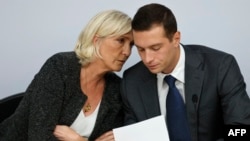
The French far-right politician Marine Le Pen has been found guilty of embezzling European Parliament funds over a 12-year-period. In a ruling that will shake both French and European politics, the Paris court ruled that she is ineligible from running for any political office with immediate effect -- meaning she most likely is out of the presidential race that is scheduled to take place in the spring of 2027 at the latest.
She left the courtroom without comment. While she can appeal the ruling, any such step could take years -- potentially spelling the end of her political career.
Le Pen, who faced a run-off against current President Emmanuel Macron in both the 2017 and 2022 races, was considered the early favorite to become the Fifth Republic’s first female president.
Already in 2022, she received 41.5 percent in the second round, the best score ever of the French far right in a presidential bid.
With Macron barred from running for a third term, Le Pen was set to be the most recognizable face in the upcoming elections, and early polls indicated she would beat any presumptive candidate from the mainstream left or right.
Whitewashing The National Front
Le Pen took over the National Front from Jean-Marie Le Pen back in 2011, rebranded it National Rally, and tried to whitewash its image by distancing the party and herself from some of her father’s more openly racist and antisemitic past.
She has remained highly critical of immigration and Islam and wants to take France out of NATO's integrated military command.
However, she has backtracked on her previous promises to take the country out of the EU and the eurozone.
Her party was granted a much-publicized loan by a Russian bank back in 2014, and while she has been widely supportive of Moscow in the past and criticized the EU’s sanctions against the Kremlin, she has been supportive of France accepting Ukrainian refugees.
Following the March 31 ruling, the Kremlin said it "deplored the violation of democratic norms."
European officials, speaking under condition of anonymity, had hoped she would potentially moderate further in office, following perhaps in the footsteps of right-wing Italian Prime Minister Giorgia Meloni, who largely has been seen as competent and cooperative in Brussels.
They did, however, cautioned that the National Rally always has positioned itself farther to the right and is a key founder of the Patriots for Europe political family together with the Hungarian ruling party Fidesz, whose leader, Viktor Orban, immediately voiced his support for Le Pen on X.
The question is what will happen to her party now.
Eight other former members of the European Parliament from the National Rally were sentenced alongside Le Pen of diverting millions of euros from European Parliament funds to pay France-based staff between 2004 and 2016, prompting the question of whether the movement can survive such a blow.
What's Next For France's Far Right?
Jordan Bardella -- who took over as the official National Rally leader back in 2021 and has been groomed as Le Pen's natural successor -- remains directly untainted by the scandal.
But can Bardella muster the same pulling power as Le Pen? Only 29, he is seen as too young and too inexperienced. While the National Rally managed to finish first in European Parliament elections in last June, the party's failure to repeat that success in national parliamentary elections later that summer raises questions about his standing.
It remains to be seen how the electorate will respond to the ruling. Many European politicians were shocked by the stinging criticism from US Vice President JD Vance earlier this year over the cancellation of the first round of Romania's presidential election in December following allegations of Russian interference on behalf of independent candidate Calin Georgescu, who surprisingly finished first.
We can expect a similar blowback this time as many on the populist right will brand this "lawfare" against politicians who aren't considered politically mainstream, and Marine Le Pen has just become their "cause celebre par excellence" who can propel them to score even higher grievance votes going forward.
If Peace Returns To Ukraine, What Next For Europe's Millions Of Refugees?

PRAGUE -- Across Europe, some 4.3 million refugees could soon have the option of returning to a peaceful Ukraine, but many no longer want to.
In the Czech Republic, Ukrainian refugees now make up some 3.6 percent of the population -- the highest ratio in Europe. A recent survey indicated less than a quarter plan to return to Ukraine once their refugee visas expire.
Anna Naduda is one of those who hopes to remain. The artist and teacher lost her youngest son in a tragic accident before the 2022 Russian invasion.
“I have a huge fear of losing another child, of losing my son,” she told RFE/RL.
Naduda speaks with warmth about the Czech capital, where she found refuge with her surviving child.
“The experience for myself and my son is that Prague met us with love,” the artist said, while molding a sculpture in a quiet suburb of the Czech capital.
The artist’s 11-year-old son has learned Czech and has settled into a school where he has friends and hobbies. “I want my child to grow up in a stable and positive environment,” Naduda said.
Naduda’s visa comes under the EU Temporary Protection Directive, an EU-wide status agreed in 2022 which currently runs until March 2026.
What happens after that date “will be coordinated depending on a conclusion of the war,” Interior Ministry spokeswoman Hana Mala told RFE/RL.
“In all likelihood there will be a transition period, in which refugees will have time to resolve their future – either by moving onto another kind of residence permit or returning home.”
New Visas For Refugees
Many of the 389,000 Ukrainians in the Czech Republic on temporary protection visas face a high hurdle to remain if a peace agreement is reached.
From April 1, Ukrainian refugees will be able to apply for a “special” residency visa that would grant them permission to stay on beyond the conclusion of the war and offer a potential pathway to permanent residency.
But applicants are required to earn an annual gross income of 440,000 crowns ($19,200). That threshold increases by 110,000 crowns for each dependent in a household.
“I need to earn more,” Naduda says with a laugh, “that is my goal for this year.”
Czech Interior Minister Vit Rakusan has suggested there will be other paths for refugees to follow if they wish to remain. “They’d have the same rules as any other foreign nationals,” he said in February.
Rakusan said surveys suggested some 200,000 might stay. “That’s a situation that we could certainly handle,” he added.
But immigration lawyers RFE/RL spoke to say those avenues will be limited.
Hana Frankova, the head of legal at the Czech-based Organization For Aid To Refugees, says in the event of peace, and without extension to temporary protection visas, Ukrainian refugees "will probably be able, in theory, to apply for asylum." But she adds that "this would only make sense in case of someone having asylum reasons." The legal expert estimates only some 10 percent of Ukrainian refugees in the Czech Republic would be eligible for the special residency permit given its current income requirement.
Svatava Pospiskova, a visa expert at the firm Czech Visa Lawyer, says if a cease-fire is announced and the temporary protection visa scheme is not extended, Ukrainian refugees would have "the opportunity to reside in the [Czech Republic] for up to 90 days under visa-free travel, but not for the purpose of earning a living." She added that applicants would need to apply for residence permits at the Czech Embassy in Ukraine.
Yulia Dobrynina is a photographer and former lawyer who fled Kyiv in 2022 and now works at an NGO helping other displaced people in Prague to integrate.
Dobrynina believes women with male children in the Czech Republic are likely to do anything to stay out of Ukraine, hinting there is little faith that the Russian invasion will be ended by a peace agreement.
“We’ve had this war not only for three years…. It’s a 300 year war, they always come back, they always want to kill us,” she told RFE/RL.
Dobrynina also aims to stay on beyond a potential end to the war. “I have no place to come back to,” she said, adding that her home town of Melitopol is under Russian occupation.
The NGO worker is also unsure if her income would meet the threshold for the special visa. “I don’t know, [it could be] one crown minus, one crown plus,” she says, referring to the Czech currency.
Refugees In Poland And Germany
Ukrainian refugees in other European countries also face uncertainties about how long they can stay. Germany and Poland have the most, with 1.16 million and 992,000, respectively, according to EU figures. In both countries, there have been moves to reduce the level of social-welfare support available to Ukrainian refugees.
Polish Prime Minister Donald Tusk floated such proposals in early January, while Germany’s likely future Chancellor Friedrich Merz made similar suggestions last year.
“At first many people were ready to help, they had understanding for Ukraine,” Angelika Gumz, the owner of a Ukrainian café in Berlin, told RFE/RL in February.
“As time has passed, the attitude has changed.”
The level of benefits available to refugees has also caused political controversy in the Czech Republic.
Official statistics show refugees have been a slight drain on the Czech economy since 2022 but that the trend is now heading toward a net benefit.
Some 62 billion crowns ($2.7 billion) has gone to refugees since February 2022, with tax and other contributions from the same group adding up to 55 billion crowns.
But in 2024, Ukrainian refugees contributed some 5.7 billion crowns more than they received from the Czech state.
























